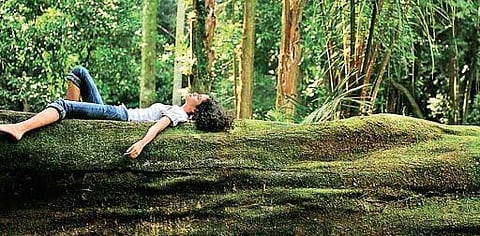

I-Wellness is yet to become a catch phrase like J-Wellness and K-Beauty. In spite of India’s great healing traditions, Ayurveda and yoga aren’t part of daily fitness schedules on a wide scale. But Japan’s ancient esoteric healing and wellness culture is catching the imagination of the world that’s constantly in search of new miracle cures. J-Wellness is a balanced state of the mind, body and the soul to achieve perfect serenity and quality of life.
As the Global Wellness Summit 2020 Report observes, “Japan is not standing still, but rather executing exciting innovations on top of its cultural traditions of trust, exacting quality in all matters, and a deep reverence for nature.” The world has woken up to the power of J-Wellness, which is motored by Ikigai—the Japanese word for ‘a reason to live’. Ikigai is a mystical inner space of equilibrium where needs, desires, ambitions and satisfaction come together. Just like in traditional Indian healing systems, philosophy lies at the heart of J-Welless.
Take Kintsugi—the art of repairing ‘broken pottery’ and Wabi-sabi that embraces the flawed or the imperfect—an object’s use marks its value since its broken parts, cracks and repairs reflect events in its existence akin to a human being’s passage through life. The Japanese philosophy of ‘mushin’, or ‘no mind’ is relevant to Kintsugi and encourages non-attachment, acceptance of change, and fate as aspects of human life.
Shinrin-Yoku or forest bathing is a nature practice, which has become a worldwide phenomenon that reflects the intense relationship of the Japanese with nature. There are now 62 official healing forests and 1,200 certified guides with the Forest Therapy Society, which saw over 2.5 million people walking the healing forest trails in 2018. The practice harmonises all five senses and reduces blood pressure, lowers stress and blood sugar, improves the heart, metabolism, concentration, memory and energy.
The phytoncide chemical in cedar and cypress trees have calming properties and boosts immunity. A study showed a 53 percent increase in the body’s natural killer cell count after spending two days in such forests. Incense is a vital aspect of Japanese healing. Seventy percent of all incense is manufactured in Awaji-shima, a small island southwest of Kobe city, by artisans who have been trained by incense masters for years. J-Wellness promotes Koudou— ‘incense listening’, which emerged in the 13th century. Koudou is a highly ritualistic practice that involves the identification of incense aromas.
Japanese incense sticks have taken the world by storm, as J-Wellness products and techniques become popular in global spa culture. The age-old formulas of J-Wellness has got a modern addition, whose basis lies in the ancient mind and body practices of Japan. As much as Zen is a solitary but satisfying quest for the perfect personal state, the Japanese lay great emphasis on mutual trust and bonding as a means to empower personal and business relationships.
The Japanese government has popularised Ikiiki Plazas where people congregate, meet and share. Ikiiki deals with psychological wellbeing elements such as positivity, mood-stability, self-acceptance and life-satisfaction. Prevention of mental disorders is the mandate. The aim reflects the core belief of Japanese psyche—a balance of good mental and physical health is crucial to compete and win in the world.
KonMari is a new life science evolved by highly influential Japanese wellness author Marie Kondo. KonMari is about decluttering life. Imagine how you would like your home and life to be. Assess your possessions by category, not by location. Start by discarding those which no longer spark joy but thank each one sincerely before throwing away—you’ll get over the self-consciousness part eventually. Discard first instead of choosing what to keep—clothes, books, papers, miscellaneous items and, finally, sentimental objects. This is how you can assess the spiritual value of your possessions.
The world has woken up to the power of J-Wellness, which is motored by Ikigai—the Japanese word for ‘a reason to live’. Ikigai is a mystical inner space of equilibrium where needs, desires, ambitions and satisfaction come together. Just like in traditional Indian healing systems, philosophy lies at the heart of J-Welless.